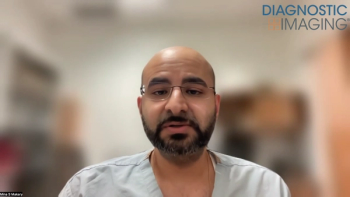
Radiologists Can Help Spot Domestic Abuse, Sexual Assault
Images that show specific types of injuries and old injuries could help radiologists identify victims of domestic and sexual abuse.
Radiologic signs of injury could help identify victims of intimate partner violence, according to a study presented today at
Researchers from the United States studied the demographics, clinical presentation, and radiologic findings in patients who were victims of domestic and sexual abuse. "Radiologists must be aware that intimate partner abuse is a common public health problem," study author Elizabeth George, MD, a radiology resident at Brigham and Women's Hospital in Boston, MA, said in a release. "It affects one in four women in the United States. So many of the patients we encounter may have this unfortunate story."
The researchers identified 87 patients who had been referred to the domestic abuse program (mean age 34.7) and 35 referred to sexual assault programs (mean age 27.3). Demographics, clinical presentation, and radiologic studies performed within five years of presentation were reviewed from the electronic medical records.
Results showed that 95% of the patients in the domestic abuse program were female and 40% were African American. A total of 665 radiology exams were performed in this population over five years, most commonly chest X-rays, followed by obstetric ultrasounds and musculoskeletal X-rays. The most common traumatic injuries were:
• Extremity fractures (n=6)
• Nasal bone fractures (acute/chronic, n=4)
• Orbital fractures (n=2)
• Soft tissue injury (hematoma/laceration, n=7)
• Spinal fracture/compression (n=3)
Other findings potentially related to violence were:
• Subchorionic hematoma (n=5)
• Pregnancy failure (n=6)
• Intrauterine growth retardation (n=2)
The 35 sexual assault victims were mostly female (91%) and African-American (46%). A total of 109 radiology exams were performed in this population over five years, most commonly chest X-rays, followed by head CTs, pelvic ultrasounds and musculoskeletal X-rays. There were fewer traumatic injuries in this population:
• Orbital wall deformity (n=1)
• Soft tissue swelling (n=2)
• Spinal compression fracture (n=1)
"Our findings point toward the complex nature of these social situations and the need for a targeted intervention program not only to identify but also intervene in the various aspects of care of these patients," lead investigator Bharti Khurana, MD, emergency radiology fellowship program director at Brigham and Women's Hospital, said in the same release. "In the emergency room setting, the priority is to identify acute pathologies," she said. "As a result, old fractures or fracture-related deformities may not be given sufficient importance. But the presence of old and acute fractures may be pivotal in making the diagnosis of intimate partner violence."
[[{"type":"media","view_mode":"media_crop","fid":"64544","attributes":{"alt":"","class":"media-image","id":"media_crop_686862371701","media_crop_h":"0","media_crop_image_style":"-1","media_crop_instance":"8257","media_crop_rotate":"0","media_crop_scale_h":"0","media_crop_scale_w":"0","media_crop_w":"0","media_crop_x":"0","media_crop_y":"0","title":" Image of 21-year-old woman, who presented with a chronic nasal bone fracture and soft tissue swelling of the left lateral face. Review of electronic medical records revealed presentation to an outside hospital 9 months ago with oblique fracture of the right ring finger proximal phalanx, blowout fracture of the medial wall of the left orbit and similar soft tissue swelling of the left face. Traumatic findings separated in time suggest recurrent violence. ©RSNA 2017","typeof":"foaf:Image"}}]]
Newsletter
Stay at the forefront of radiology with the Diagnostic Imaging newsletter, delivering the latest news, clinical insights, and imaging advancements for today’s radiologists.












